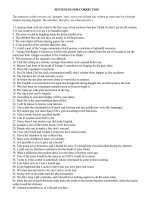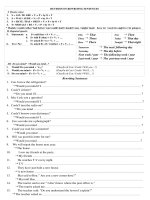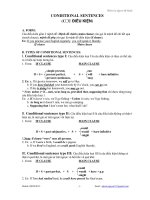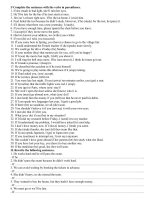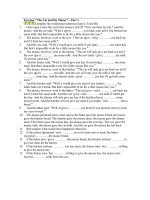GrammarConditional sentences
Bạn đang xem bản rút gọn của tài liệu. Xem và tải ngay bản đầy đủ của tài liệu tại đây (131.24 KB, 2 trang )
Written by Nguyen Mai Khanh
Conditional sentences
(CÂU ĐIỀU KIỆN)
A. Form:
Câu điều kiên gồm 2 mệnh đề: Mệnh đề chính (main clause) còn gọi là mệnh đề chỉ kết quả
(result clause), mệnh đề phụ còn gọi là mệnh đề điều kiện (if clause).
Ex: If you practise your English regularly, you will speak it fluently.
If clause Main clause
B. Types of Conditional sentences:
I. Conditional sentences type I: Câu điều kiện loại I là câu điều kiện có thực có thể xãy
ra ở hiện tại hoặc tương lai.
1. Form: If clause Main clause
simple present, can
If + S + present perfect, + S + will + bare-infinitive
present continuous, may
2. Ex: a. If it is nice tomorrow, we will go to Hue.
b. If you have finished your homework by 8 o’clock, you can go out.
c. If she is doing her homework, you may go out.
* Note: unless (= if…not), so/as long as, provided that, supposing that chỉ được dùng trong
câu điều kiện loại 1.
Ex: a. If it doesn’t rain, we’ll go fishing = Unless it rains, we’ll go fishing.
b. As long as it doesn’t rain, we can go camping.
c. Supposing that I don’t meet her, what shall I do?
II. Conditional sentences type II: Câu điều kiện loại II là câu điều kiện không có thật ở
hiện tại, là một giả sử trái ngược với hiện tại.
1. Form: If clause Main clause
could
If + S + past subjunctive, + S + would + bare-infinitive
might
* Note: if clause “were” uses all persons.
2. Ex: a. If I were a birth, I would be a pigeon.
b. If we lived in England, we could speak English fluently.
III. Conditional sentences type III: Câu điều kiện loại III là câu điều kiện không có
thật ở quá khứ, là một giả sử trái ngược và hối tiếc về quá khứ.
1. Form: If clause Main clause
could
If + S + past perfect, + S + would + have + p.p
might
2. Ex: If Tom had studied hard, he could have passed the final exam.
Mobile: 0905010135 - 1 - Email:
Written by Nguyen Mai Khanh
IV. Mixed conditional sentences: Câu điều kiện pha trộn loại II và loại III để diển tả
một hành động hay sự việc xảy ra trong quá khứ ảnh hưởng đến hiện tại.
. Ex: a. Mary ate a lot of ice-cream last night. Now she feels sick.
If Mary hadn’t eaten so much ice-cream last night, she wouldn’t feel sick.
b. If I were you, I would have accepted his invitation.
V. Other conditional sentences type:
1. Dùng thì hiện tại đơn cho cả hai mạnh đề để diển tả sự thật, thói quen.
Ex: a. If you ring on Sunday, no one answers.
b. If he has free time, he often plays video games.
2. Ta có thể dùng dạng mệnh lệnh ở mệnh đề chính trong câu điều kiện loại I.
Ex: a. If you need any help, just ask.
b. If you are busy, don’t go.
3. Dùng “should” hoặc present subjunctive (hiện tại giả định) nhấn mạnh sự không chắc chắn
hoặc hoài nghi.
Ex: a. If any one should call, please let me know.
b. If the news be true, we may get much trouble.
4. without + noun phrase = if + S + past subjunctive/ past perfect.
Ex: a. Without electricity, our life would be difficult.
If there were no electricity, our life would be difficult.
b. Without your help, we wouldn’t have done this exercise.
If you hadn’t helped us, we wouldn’t have done this exercise.
5. But for + noun phrase = if + S + past perfect.
Without your help, we wouldn’t have done this exercise.
Ex: But for your help, we wouldn’t have done this exercise.
If you hadn’t helped us, we wouldn’t have done this exercise.
6. Deleting “If”. Trong câu điều loại II và loại III, chúng ta có thể bỏ “if” và dïng dạng đảo
ngữ.
Ex: a. If I were a little taller, I would join the army.
Were I a little taller, I would join the army.
b. If Tom had studied hard, he could have passed the final exam.
Had Tom studied hard, he could have passed the final exam.
.Với “should” trong câu điều kiện loại I:
Ex: If someone should ask me, please give him my phone number.
Should someone ask me, please give him my phone number.
Mobile: 0905010135 - 2 - Email:





